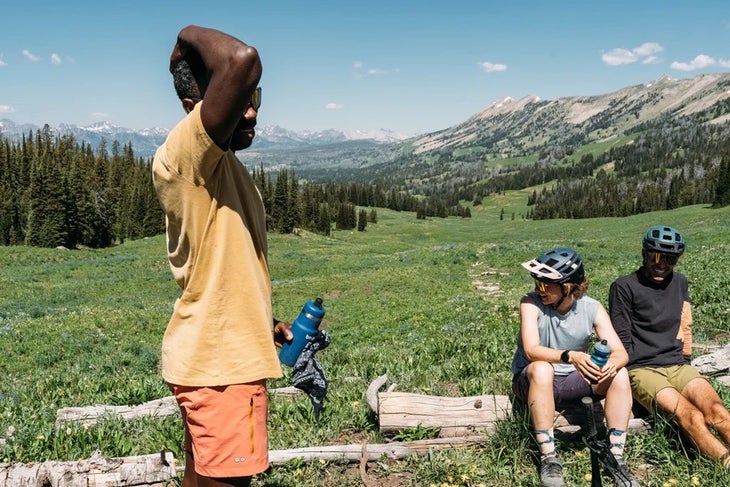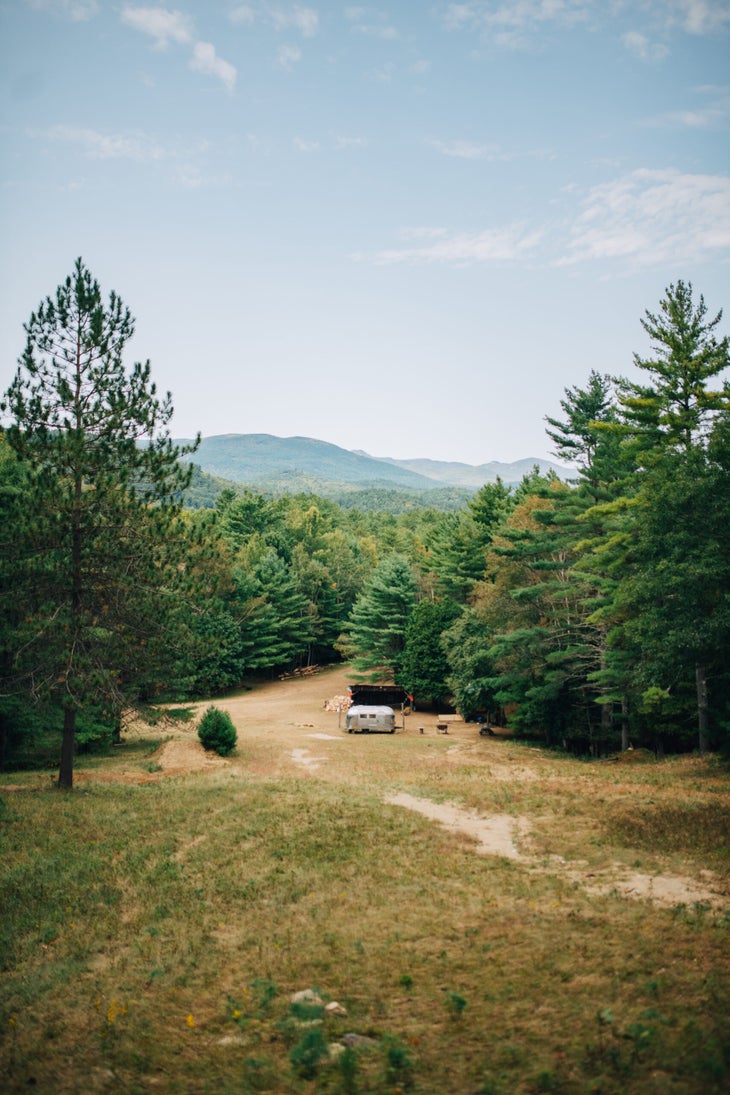In a 1949 speech in the tiny town of Lyndonville, Vermont, senator George Aiken stated, “You know, this is such beautiful country up here. It ought to be called the Northeast Kingdom of Vermont.”
Aiken was referring to the counties of Orleans, Essex, and Caledonia, situated between Canada to the north, the Green Mountains to the west, and the Connecticut River to the east. Glaciers of the Pleistocene epoch, which retreated about 14,000 years ago, left behind the rolling landscape of craggy granite peaks, sloping valleys, and fathomless lakes.
The 2,027-square-mile region has several distinctions: French oceanographer Jacque Costeau’s first dive site (Harvey’s Lake, depth: 144 feet); the home of the renowned counter-cultural touring company the Bread and Puppet Theater (Glover, population: 157); the location of perennial “Best Brewery in the World” winner Hill Farmstead (Greensboro Bend, population: 265); and the landscape of Kingdom Trails, one of the premier mountain biking destinations in the world (Burke, population: 1,636).
“The Kingdom,” as it is known locally, has a population of only 65,000, yet a high number of folks with roots in the region are the founders of a new breed of spunky, colorful outdoor brands. Skida, Curious Creatures, Ripton and Co., Pit Viper, and Party Shirt International were all started by central-northern Vermonters who spent a significant amount of time in the Kingdom. They either grew up there, went to school at Burke Mountain Academy (BMA, alma mater of Mikaela Shiffrin, as well as 36 other Olympians), or cut their teeth on the slopes and trails of that corner of the state. To outsiders, it may seem surprising that such entrepreneurial individuals have all drawn inspiration from the Kingdom. But to locals, it makes perfect sense that this adventure hub would produce the creators of quirky adventure gear and apparel.
An Entrepreneurial Legacy
One county over from the Northeast Kingdom, a couple of OGs of the Vermont textile industry have headquarters. Darn Tough, based in Northfield (population: 5,939), has made wool socks trusted by hikers, runners, and skiers since 2004. Founder Ric Cabot’s father started its hosiery mill in 1978. Travel 20 miles south on I-89 and you’ll find Vermont Glove, maker of bombproof hand-sewn leather work gloves in Randolph (population: 4,842) since 1920. Both companies are the rare holdovers from the kind of regional manufacturing that has largely collapsed in Vermont and other rural areas in the United States.
“There was a vibrant textile industry up in Newport, and that dissipated in the 1980s as globalization drew manufacturing overseas,” explained Corinne Prevot, founder of Skida, who wrote her senior thesis at Middlebury on economic opportunity in outdoor recreation in the Northeast Kingdom. “All of these heavy industries came and went, and that left behind a lot of really talented sewers.”
According to Prevot, many of these sewers adapted by pivoting to small-scale or home-based production such as quilting, tailoring, custom work, and entrepreneurial crafts for fairs and farmers markets. Female sewers found the flexibility of these cottage industry opportunities appealing, as they often had to juggle family responsibilities as well. Turtle Fur was founded in 1982 in Stowe, Vermont. In the 1990s, Ibex was started in Woodstock, Vermont, and Isis—a brand that made women’s outdoor apparel—began in Burlington, Vermont.
Prevot grew up on a farm in Pennsylvania, her dad went to BMA in the 1970s, and her grandmother lived on a farm in Lyndonville (the site of Senator Aiken’s infamous speech; population: 1,222). The family visited the Kingdom often and Prevot was enchanted by the region, eventually following in her dad’s footsteps and attending BMA herself.
At Burke, Prevot switched from alpine to nordic skiing, which required a different set of equipment. She couldn’t find the right hat, and noticed that many cycling caps were made from a four-way stretch lycra blend. She grew up sewing, so Prevot bought some colorful fabric and made hats for herself and her teammates. At their first race in 2007, the hats created a buzz, and other skiers asked to buy them. The interest continued at the next race, and before long, Prevot added fleece linings and headbands to her repertoire.
To meet demand, Prevot needed help with the sewing. The wife of someone who worked at BMA was a seamstress and pitched in. She knew others who had previously worked at the factories in Newport and connected Prevot with an untapped network of sewers. Thus, Skida officially launched in 2008, though Prevot didn’t operate the company full time until she graduated college in 2013. A significant portion of products are still cut and sewn in Vermont.

A Community to Lean On
For residents of Northern Vermont, engaging with the outdoors is more of a lifestyle than a choice.
“We’re the only state with more dirt roads than paved roads,” said Elliot Wilkinson-Ray, founder of performance denim mountain biking brand Ripton and Co. “Winters are harsh and life is tough and rugged, so people have higher thresholds for pain and discomfort. I think that sort of tenacity is an important ingredient for starting businesses and building brands.”
Wilkinson-Ray grew up in Richmond (population: 4,117) alongside Pit Viper founder Chuck Mumford. Richmond is part of Chittenden County in the northwest part of Vermont, a county that also includes Burlington, the most populous city in the state. As a burgeoning photographer, Wilkinson-Ray often traveled to the Northeast Kingdom to experience its natural beauty and adventure possibilities.
After attending the University of Vermont, Wilkinson-Ray and his brother, Tyler, made United We Ski, a documentary about small New England ski hills, including a couple in the Northeast Kingdom.
“That was a transformational experience for us,” said Wilkinson-Ray. “The community rallied around it, helped fund it, and taught us to go after cool ideas. That was definitely an inflection point.”
“It’s an unconventional place that teaches unconventional thinking,” noted Natasha Woodward, founder of Curious Creatures, a mountain biking apparel brand. Woodward grew up in central-northern Vermont and New Hampshire, and, like Prevot, also attended BMA and Middlebury, where she was a ski racer. Following college she went to the Parson’s School of Design, and eventually landed at Patagonia as a product designer.
In the meantime, her parents moved to East Burke, and she and her husband got married in their backyard. Three years ago, she left Patagonia to start Curious Creatures. She credits the harsh weather and unpredictable landscape of the Northeast Kingdom with instilling both her drive and her playful aesthetic.
“I’ve done hard things,” said Woodward, thinking back to frigid BMA workouts. “The weather kind of sucks and there’s so [fewer] really good days. You have to be on another level of loving it. It’s not about the selfie or the epic peak. It’s down to the simplest things, sliding around in the snow or riding around on trails and feeling the wind in your hair. Something about it is a little bit pure and no one’s taking themselves too seriously.”
Both Wilkinson-Ray and Woodward started their brands out west, in Boulder, Colorado, and Bozeman, Montana, respectively, but it is safe to say they brought a little bit of the Northeast Kingdom with them. “[My] approach [to] product [is that] I’m always trying to remember the East Coast and how gnarly those people are,” explained Woodward.
“I think a lot of great success stories, whether they’re entrepreneurs or athletes, have come from small towns and humble beginnings because there’s a nurturing culture and everyone’s telling you you can achieve your dreams,” said Wilkinson-Ray. “Then you just keep projecting that outward for the rest of your life.”
The other advantage these founders have is one another: They lean on each other for advice, inspiration, and professional skills. Wilkinson-Ray shot a lot of Skida’s early photography and managed their social media for a stretch. “We’re all learning from each other,” reflected Prevot. “It’s so cool to watch these people go off on a limb and shoot from the core of what they know and let it all unfold organically. In a saturated industry there has to be that DNA and that vibe for it to ignite.”

A New Kingdom
The last few summers, calamitous flooding brought on by climate change has damaged the delicate infrastructure of northern Vermont. As is always the case, folks have leaned on their community to help repair and rebuild.
“People endure here,” said John Campbell, Peacham resident (population: 718) and owner of Alpine Luddites, an operation making bespoke adventure packs. (Considering climbing Everest in 2027? Place your order now. The waitlist is 18 to 24 months). “You have to rely on your community. I would do anything for all of my neighbors and that’s a mutual thing. I think that’s what’s unique about Vermont.”
Woodward has witnessed firsthand how the community around Burke has transformed. In 1998, an initiative called Kingdom Trails started and linked over 100 miles of trails together. Today, the network works with 102 landowners who grant access to their properties.
“I don’t think it would happen anywhere else,” she said. “My parents have a tiny little trail that goes through their land and they’re so proud. Being excited by the growth of the sport and what trails can do to communities inspired a lot of the thinking behind Curious Creatures.”
Woodward recalled a very different East Burke when she went to high school than the one her parents now live in. Faculty turnover at BMA was high because social life was non-existent. “There was a gas station and a pub that changed owners every two years,” said Woodward. “It’s been really cool to watch how the trails have changed that.”
East Burke now has breweries, cafes, and even a tiki bar. Indeed, there is a certain if-you-build-it-they-will-come ingenuity in a place that can’t rely on foot traffic but instead can only create vibe traffic. The Northeast Kingdom is the type of place that invites a pilgrimage, whether it’s to Parker Pie Co. for a pizza or Auntie Dee Dee’s for a pastry.
The awe-inspiring country that prompted Senator Aiken’s epithet may have seen a few threads unravel over the years, whether it is the collapse of regional manufacturing or the infrastructure washed out by flooding. Yet it has also been knitted together by epic trails, heady beers, delicious pastries, and rad hats. The spirit of the Kingdom is alive and well.
